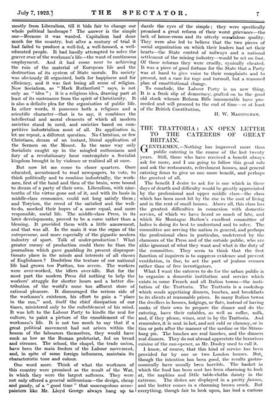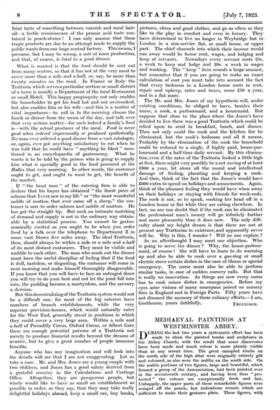THE TRATTORIA : AN OPEN LETTER TO THE CATERERS OF
GREAT BRITAIN.
GENTLEMEN,—Nothing has improved more than public catering in the course of the last twenty years. Still, those who have received a benefit always ask for more, and I am going to follow this good rule and ask the restaurants, refreshment houses, and general catering firms to give us one more benefit, and perhaps the greatest of all.
The benefit I desire to ask for is one which in these days of dearth and difficulty would be greatly appreciated by the professional and upper middle class—the class which has been most hit by the rise in the cost of living and in the rent of small houses. Above all, this class has the greatest difficulties in connexion with domestic service, of which we have heard so much of late, and which Sir Montague Barlow's excellent committee of ladies is doing its best to understand and to solve. The committee are serving the nation in general, and perhaps the professional class in particular, undeterred by the clamours of the Press and of the outside public, who are alike ignorant of what they want and what is the duty of the committee. They seem to think that the first function of inquirers is to suppress evidence and prevent ventilation, in fine, to act the part of jealous censors rather than of free investigators.
What I want the caterers to do for the urban public is to organize a domestic institution and service which exists in some French and all Italian towns—the insti- tution of the Trattoria. The Trattoria is a cookshop which sends appetizing dinners, lunches, and breakfasts to its clients at reasonable prices. In many Italian towns the dwellers in houses, lodgings, or flats, instead of having cooks of their own to prepare the dinner and do the catering, have their eatables, as well as coffee, milk, and, if they please, wines, sent in by the Trattoria. And remember, it is sent in hot, and not cold or clammy, or in tins or pots after the manner of the sardine or the Strass- burg pie. The lunches are real lunches, and the dinners real dinners. They do not abroad appreciate the luxurious cuisine of the can-opener, as Mr. Dooley used to call it.
I know, of course, that this kind of service has been provided for by one or two London houses. But, though the intention has been good, the results gastro- nomically have usually been horrible. The basket in which the food has been sent has been charming to look at, the napkins and little table-cloths dainty in the extreme. The dishes are displayed in a pretty faience, and the butter comes in a charming brown crock. But everything, though fair to look upon, has had a curious faint taste of something between varnish and rural hair- oil—a feeble reminiscence of the prussic acid taste con- tained in peach-stones ! I can only assume that these tragic products are due to an attempt made to supply the public wants from one huge central factory. This means, I presume, but I may be wrong, a sort of mass production, and that, of course, is fatal to a good dinner.
What is wanted is that the food should be sent out from many centres, so that it has not at the very most to cover more than a mile and a-half, or, say, be more than twenty minutes on the road. In France or Italy the Trattoria which serves a particular section or small district of a town is usually a Department of the local Restaurant or small Hotel. This happy propinquity not only enables the householder to get his food hot and not overcooked, but also enables him or his wife—and this is a matter of vital importance—to call in in the morning, choose the lunch or dinner from the menu of the day, and talk over that very serious matter—for such indeed a family's food is—with the actual producer of the meal. Food is never good when ordered impersonally or produced synthetically. No man ever ordered a good dinner from a vast catalogue, or, again, ever got anything satisfactory to eat when he was told that he could have "anything he liked" men- tioned in an encyclopaedia of gastronomy. What he wants is to be told by the person who is going to supply him what is specially good in the food procured at the Halles that very morning. In other words, the customer ought to get, and ought to want to get, the benefit of the market.
If "the head man" of the catering firm is able to declare that his buyer has obtained " the finest piece of salmon that I ever saw in my life" or "the most wonderful saddle of mutton that ever came off a sheep," the cus- tomer is sure to order salmon and saddle of mutton. He has got the straight tip. But such an intimate matching of demand and supply is not in the ordinary way obtain- able by a statistical process. You cannot be gastro- nomically excited as you ought to be when you order food by a talk over the telephone to Department Z in some vast Stores five miles away. The ideal Trattoria, then, should always be within a mile or a mile and a-half of its most distant customers. They must be visible and audible to each other. The man who sends out the dinner must have the useful discipline of feeling that if the food is dull, tasteless, or disgusting, the customer will come in next morning and make himself thoroughly disagreeable. If you know that you will have to face an outraged diner you will try to do your best and not let the joint fall into ruin, the pudding become a martyrdom, and the savoury a derision.
But this decentralizing of the Trattoria system would not be a difficult one, for most of the big caterers have numbers of branch establishments, while the very superior provision-houses, which would naturally cater for the West End, generally stand in positions in which they could cover a very large area. Within a mile and a-half of Piccadilly Circus, Oxford Circus, or Albert Gate there are enough potential patrons of a Trattoria not merely to produce financial results beyond the dreams of avarice, but to give a great number of people immense benefits.
• Anyone who has any imagination and will look into the details will see that I am not exaggerating. Let us take a case. Mr. and Mrs. Jones are a young couple with two children, and Jones has a good salary derived from a grateful country in the Calculations and Costings Office. Altogether, they are prosperous people, but wisely would like to have as small an establishment as possible in order, as they say, that they may take really delightful holidays abroad, keep a small car, buy books, pictures, china and goad clothes, and go as often as they like to the play in comfort and even in luxury. They• have determined to live no longer in Weybridge but in London in a non-service flat, or small house, or upper part. The chief channels into which their income would run away would be house rent, wages, and lodging and keep of servants. Nowadays every servant costs 25s. a week to keep and lodge and 20s. a week in wages and washing. The " keep " item sounds a large amount, but remember that if you are going to make an exact calculation of cost you must take into account the fact that every bedroom in a London house costs in rent, repair and upkeep, rates and taxes, some £50 a year, and in a flat more.
The Mr. and Mrs. Jones of my hypothesis will, under existing conditions, be obliged to have, besides their nurse, a cook, a parlourmaid, and a housemaid. But suppose that close to the place where the Jones's have decided to live there was a good Trattoria which could be relied upon to send in breakfast, lunch, and dinner. Then not only could the cook and the kitchen fire be eliminated, but the cook's bedroom and all it means. Probably by the elimination of the cook the household could be reduced to a single, if highly paid, house-par- lourmaid and a half-time daily servant. By this elimina- tion, even if the rates of the Trattoria looked a little high at first, there might very possibly be a net saving of at least £300 a . year, let alone all the moral and intellectual damage of finding, placating and keeping a cook. And then, think of the fact that the Jones's would have 1300 extra to spend on holidays and amusements. Again, think of the pleasant feeling they would have when away on their holidays or staying with friends for week-ends. The cook is not, so to speak, cooking her head off in a London house or flat while they are eating elsewhere. In fact, no one can doubt that if the cook can be eliminated the professional man's money will go infinitely further and more pleasantly than it does now. The only diffi- culty about my bright dream is that there are not at present any Trattorias in existence, and apparently never will be. Why is this, I wonder ? Will no one explain ?
As an afterthought I may meet one objection. Who is going to serve the dinner ? Why, the house-parlour- maid, of course ! She will have to learn to do warming up and also be able to cook over a gas-ring or small electric stove certain dishes in the case of illness or special emergency. The nurse must also be able to perform similar tasks, in case of sudden nursery calls. But that is really no innovation. As things are now every nurse has to cook minor dishes in emergencies. Before my eyes arise visions of many saucepans poised on nursery fires in England and in Foreign Parts. Fifty years have not dimmed the memory of these culinary efforts.—I am, Gentlemen, yours faithfully, FRorESSOR.















































 Previous page
Previous page